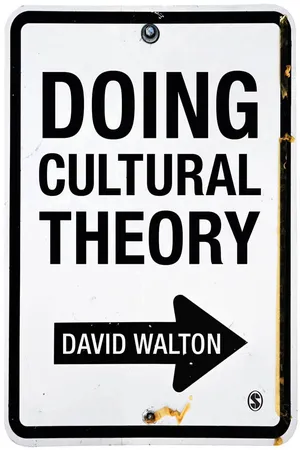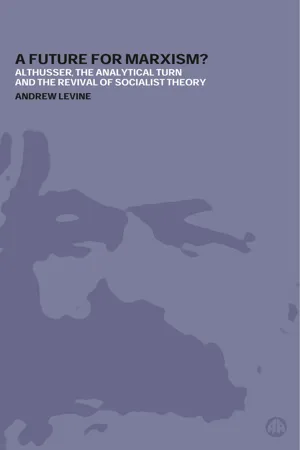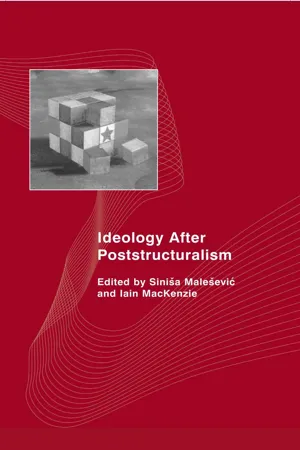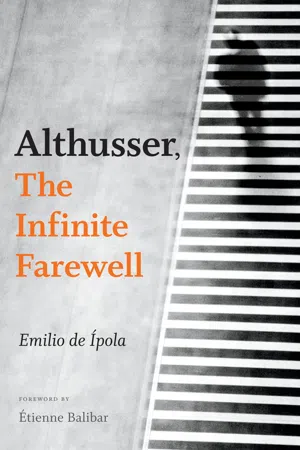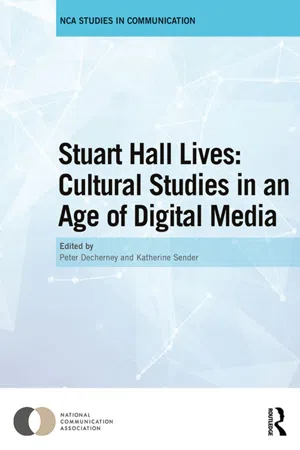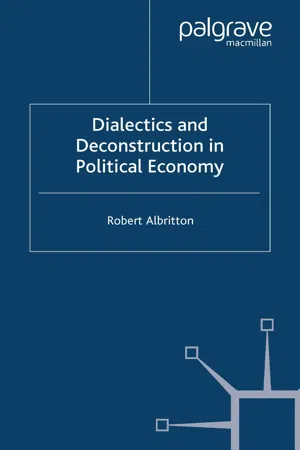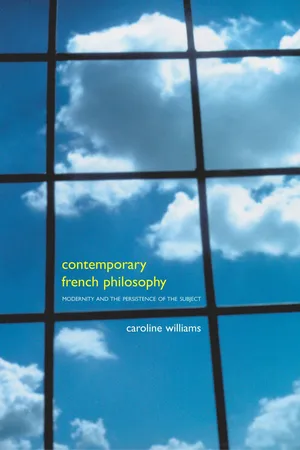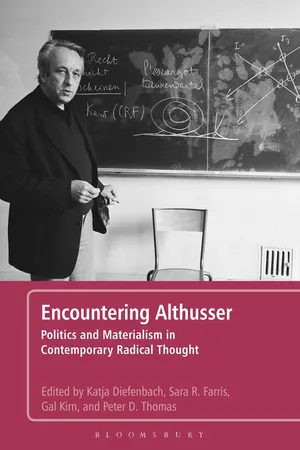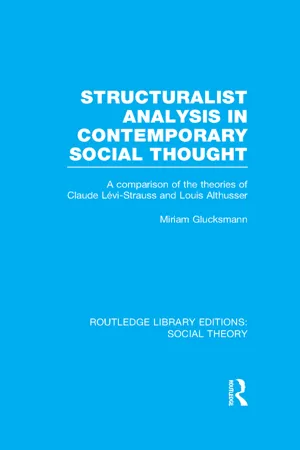Social Sciences
Louis Althusser
Louis Althusser was a prominent French Marxist philosopher known for his influential contributions to the field of social sciences. He is best known for his theory of ideology, which posits that individuals are interpellated or hailed into subject positions by ideological state apparatuses. Althusser's work has had a lasting impact on the study of power, ideology, and social structures.
Written by Perlego with AI-assistance
Related key terms
1 of 5
12 Key excerpts on "Louis Althusser"
- eBook - ePub
- David Walton(Author)
- 2012(Publication Date)
- SAGE Publications Ltd(Publisher)
4
Ideology
Marxism and Louis Althusser
Learning goals- To appreciate how Louis Althusser’s thought is indebted to structuralist ways of thinking and how it differs from more ‘culturalist’ approaches.
- To understand the nuances of Atlhusser’s conception of ideology and how it functions to create subjects in society.
- To become aware of the interconnections between the main concepts introduced.
- To see how the key concepts work and how they may be put into practice.
ConceptsThe key concepts introduced in this chapter are: ideology, the ideological state apparatuses, the repressive state apparatuses, overdetermination, the material and imaginary aspects of ideology, interpellation, double reading, the problematic and symptomatic reading.Introduction
This chapter introduces some of the ideas that cultural studies has found most useful in the work of the Marxist philosopher Louis Althusser, something which will involve detailed discussions of how Althusser’s notion of ideology is indebted to structuralist ways of thinking. The chapter will be concluded by outlining the rift between the Althusserians and other Marxists, like E. P. Thompson, who were more committed to the idea of human agency.Introduction: Althusserian structuralism
Louis Althusser was a French Marxist philosopher whose ideas have had a decisive influence on cultural studies. What is distinctive about his work is the way in which he combined Marx’s writings with the structuralist ideas that were circulating at the time. Although his greatest influence was during the 1970s and 1980s he still remains an important source of concepts within cultural studies. This is particularly the case when questions of ideology are discussed. To begin my introduction to Louis Althusser’s impact on cultural studies I will refer to Clifford Geertz’s point that he did not think that culture was best seen in the more traditional terms of customs, traditions and ingrained habits, etc. but as ‘a set of control mechanisms – plans, recipes, rules, instructions’ that govern behaviour (1973: 44). If culture is seen as a ‘control mechanism’ this seems to suggest that it is deterministic (that is, that people are not free to choose but governed by social structures). However, the extent to which culture is a control mechanism depends on how much emphasis is put on the idea of the underlying rules of culture as a kind of langue in relation to particular cultural practices, which would be the paroles - eBook - PDF
A Future For Marxism?
Althusser, the Analytical Turn and the Revival of Socialist Theory
- Andrew Levine(Author)
- 2003(Publication Date)
- Pluto Press(Publisher)
Althusser was prone to couch constructive and largely defensible positions in provocative formulations – intended, it almost seems, less to enlighten than to entice or outrage practitioners of historicist Marxism, as well as devotees of that antihistoricist but still resolutely obscurantist and peculiarly French contemporaneous phenomenon, structuralism. Althusser assumed this guise with great virtuosity. His style was ironic and elegant; and his writing, though limpid, was often difficult to decode. But it is eminently feasible, in retrospect, to penetrate through to the core of Althusser’s thought, and therefore to judge his contribution to Marxist theory, and to the larger socialist tradition, for what it is. Despite the ways his writings were taken at the time and despite how he is remembered, Althusser was, first of all, if not quite a philosopher of science, then a philosopher who advocated positions that converge with important 74 currents in the philosophy of science today. The enduring importance of his work, his contribution to the (possible) future of Marxism, lies in the way he joined these positions to Marxist themes. It is indicative of the difficulties facing Althusser’s readers that, having distinguished Marxism from Hegelianism in no uncertain terms in For Marx and Reading Capital , Althusser proceeded, in his later writings, to enlist Hegel as a proto-Marxist, declaring in terms intentionally reminiscent of a celebrated aphorism of Lenin’s, that a century after the publication of Hegel’s Logic , ‘... no one has understood Hegel because it is impossible to understand Hegel without having thoroughly studied and understood Capital ’. 2 To uncover Althusser’s contribution to Marxist thought, it will be instructive to focus, in this chapter and the next, on the twists and turns of the Hegel–Marx relationship or rather on the ways in which it is depicted in Althusser’s writings. - eBook - PDF
- Sinisa Malesevic, Iain MacKenzie(Authors)
- 2002(Publication Date)
- Pluto Press(Publisher)
First, there can be no dispute that Althusser’s work alone has had theoretical effects and consequences which he could never have anticipated. Althusser’s symptomatic reading of Marx, his account of philosophy as a practice always linked to its political conditions of existence, and his radical and subtle account of ideology as an imaginary relation, travelled long distances towards sociology and political and social theory, along a route that also passed by gender 28 and film studies, cultural and literary studies, as well as more obviously Marxist economics and radical philosophy. Michael Sprinkler (1995) points out that even amongst those who would now repudiate nearly every aspect of their Althusserian past, the occult force of Althusser’s various indications concerning ideology persists. Every theory of ideology which takes its genealogy through Marx has also to pass by way of Althusser. Why is this the case? What is so distinct about Althusser’s structuralist approach to Marxism and, more specifically, his reflections on ideology? Perhaps it is worth stopping with Althusser merely to recapture his theoretical and political predicament and to place it within our present theoretical and political landscape, a landscape marked by the challenges posed by post structuralism in particular. My second reason for returning to Althusser is that his thought opens up many of the antinomies that have haunted, and continue to haunt, the concept of ideology. Some oppositions take us straight to the field of politics. In particular, oppositions between knowledge and mystification, power and subjection, theory and praxis. Others more clearly expose ideology’s epistemological relation, namely, the dualisms between science (theory) and ideology, essence and appearance, objectivity and subjectivity, real and imaginary. - eBook - PDF
- Emilio de Ípola, Gavin Arnall(Authors)
- 2018(Publication Date)
- Duke University Press Books(Publisher)
3 With a habitually provocative style, Althusser presented these statements as final. To not accept them was tantamount to renouncing the right to call yourself a Marxist. 4 When his great works, For Marx and the two volumes of Reading Capital , came to light, things took on a different tone and dimension, right when the Cahiers marxistes-léninistes and especially the Cahier pour l’analyse were born and disseminated. To the consternation of those “open” Marxists who had already become aware of Althusser’s dismissal, along with his disci-ples, of the notion of alienation, these works, gaining quickly in popularity and reach, now targeted Marxism’s supposed humanism and historicism. Yet the high philosophical and theoretical level of the analyses and of the positions expressed therein, as well as the rigor and depth of Althusser’s contributions and the contributions of his collaborators, 5 forced his oppo-nents to recognize that a new Marxism had been born. It was, in fact, the first and only Marxism produced in France deserving of the name. This Marxism reached the height of the greatest contributions hailing from other locales, rich in its proposals, its concepts, and its theoretical and political possibilities. Having said that, as I mentioned in the previous chapter, these foundational works, which ratified Althusserianism as a reading and an in-terpretation of the legacy of Marx and Engels and as an autonomous ideo-logical and political phenomenon, appeared in the 1960s in France during the heyday of diverse forms of structuralism. The term structuralism helped bring together into a single theoretical current, above all and most princi-pally, the works of Claude Lévi-Strauss, Jacques Lacan, Michel Foucault, and Roland Barthes. - Peter Decherney, Katherine Sender, Peter Decherney, Katherine Sender(Authors)
- 2018(Publication Date)
- Routledge(Publisher)
Signification, Representation, Ideology: Althusser and the Post-Structuralist Debates Stuart Hall—This essay attempts to assess Althusser’s contribution to the reconceptualization of ideology. Rather than offering a detailed exegesis, the essay provides some general reflections on the theoretical gains flowing from Althusser’s break with classical Marxist formulations of ideology. It argues that these gains opened up a new perspective within Marxism, enabling a rethinking of ideology in a significantly different way.Althusser persuaded me, and I remain persuaded, that Marx conceptualizes the ensemble of relations which make up a whole society—Marx’s “totality”—as essentially a complex structure, not a simple one. Hence, the relationship within that totality between its different levels—say, the economic, the political, and the ideological (as Althusser would have it)—cannot be a simple or immediate one. Thus, the notion of simply reading off the different kinds of social contradiction at different levels of social practice in terms of one governing principle of social and economic organization (in classical Marxist terms, the “mode of production”), or of reading the different levels of a social formation in terms of a one-to-one correspondence between practices, are neither useful nor are they the ways in which Marx, in the end, conceptualized the social totality. Of course a social formation is not complexly structured simply because everything interacts with everything else—that is the traditional, sociological, multifactoral approach which has no determining priorities in it. A social formation is a “structure in dominance.” It has certain distinct tendencies; it has a certain configuration; it has a definite structuration. This is why the term “structure” remains important. But, nevertheless, it is a complex structure in which it is impossible to reduce one level of practice to another in some easy way. The reaction against both these tendencies to reductionism in the classical versions of the marxist theory of ideology has been in progress for a very long time—in fact, it was Marx and Engels themselves who set this work of revisionism in motion. But Althusser was the key figure in modern theorizing on this question who clearly broke with some of the old protocols and provided a persuasive alternative which remains broadly within the terms of the marxist problematic. This was a major theoretical achievement, however much we may now, in turn, wish to criticize and modify the terms of Althusser’s break-through. I think Althusser is also correct to argue that this is the way the social formation is in fact theorized in Marx’s “1857 Introduction” to the Grundrisse- eBook - PDF
- Mary Klages(Author)
- 2006(Publication Date)
- Continuum(Publisher)
Althusser makes this distinction in his essay ‘Ideology and Ideological State Apparatuses,’ which discusses the relation between the state and its subjects. Althusser is asking why subjects are obedient, why people follow the laws, and why there isn’t a revolt/ revolution against capitalism. His view of ideology and ideologies comes out of his understanding of the relations between state and subject, between government and citizens, so it’s worthwhile to examine those ideas for a minute. The state, for Althusser, is the kind of governmental formation that arises with capitalism. A state – you can substitute the word ‘nation’ here to help conceptualize the ‘state’ – is determined by the capitalist mode of production and formed to protect its interests. It is historically true, whether or not you are a Marxist, that the idea of nations as discrete units is coterminous with capitalism. It is also possible that democracy, as an ideology and/or a governmental form is also coterminous with capitalism, as democracy gives the ‘illusion’ that all people are equal, and have equal power, and hence masks relations of economic exploitation. Althusser mentions two major mechanisms for insuring that people within a state behave according to the rules of that state, even when it’s not in their best interests in regard to their class positions to do so. The first is what Althusser calls the RSAs, or Repressive State Apparatuses, that can enforce behavior directly, such as the police and the criminal justice system. Through these ‘apparatuses’ the state has the power to force you physically to behave. More importantly for lit-erary studies, however, is the second mechanism Althusser investi-gates, which he calls ISAs, or Ideological State Apparatuses. These are institutions which generate ideologies which we as individuals (and groups) then internalize, and act in accordance with. These ISAs 131 IDEOLOGY AND DISCOURSE - R. Albritton(Author)
- 1999(Publication Date)
- Palgrave Macmillan(Publisher)
CONCLUSIONS Althusser’s influence on Marxism was mixed. On the one hand he introduced new questions and new levels of complexity into Marxist theory. On the other hand his extravagant claims for the scientific nature of Marxism could not be substantiated by his problematic, forcing many of his most earnest followers either to abandon Marxism or to reduce it to a mere shadow of its former self. Furthermore, his dogged anti-Hegelianism, instilled a highly negative interpretation of The Problematic Althusser 147 Hegel in the minds of a generation of scholars influenced by his ideas, and as a result blocked the possibility of understanding Hegel’s immense scientific importance to Marxian political economy. His anti-Hegelianism was advanced even further by his student, Foucault, and his friend, Derrida, as they converted his structuralism into poststructuralism. In this chapter I have used the theory of the dialectic of capital as a corrective to some of Althusser’s structuralist excesses, and as a basis for providing much stronger answers to many of Althusser’s questions. Althusser lacked an adequate understanding of the economic theory put forward by Marx in Capital and its close correspondence to Hegel’s Logic. His structuralist reading of Capital, therefore, not only failed to grasp capital’s unique ontology, but also failed to improve upon the economic theory as Marx left it. His failure to understand capital’s ontology made it possible for him to treat economics, politics and ideology as simply three ontologically homogeneous but relatively autonomous practices in his conception ‘mode of production’. Furthermore, the capitalist mode of production was treated as onto- logically similar to all other modes of production, reducing the theory of it to a regional theory within the general science ‘historical mater- ialism’.- eBook - PDF
Contemporary French Philosophy
Modernity and the Persistence of the Subject
- Caroline Williams(Author)
- 2001(Publication Date)
- The Athlone Press(Publisher)
However, the central essay of 1972, 'Ideology and Ideological State Apparatuses', rests upon the prior epistemological work carried out in Althusser's earlier works. Indeed, it is in the context of his discussions around the form and structure of ideology that the concept of the subject, being an ideological concept par excellence, is most fully developed. Althusser's rejection of the subject as the foundation, origin or essence of a theoretical concept precludes him from establishing an overly simplistic account of ideology as false-consciousness where the subject's experience becomes the source of knowledge necessary to transcend ideology. Likewise it should be clear from Althusser's critique of empiricism that a definition of ideology as an inversion, or mystification of the real, as presented by the metaphor of the camera obscura in Marx and Engels' The German Ideology, is rejected. Althusser is not concerned to investigate what particular subjects may think, or even how, by what means, they carry out the act of thinking, rather he is concerned with the ideological mechanism according to which thought, perception and subjectivity are produced. For this position, ideology is not to be associated with the realm of ideas; it is material and relational precisely because of its structural existence. Ideology is an element of the social totality and functions in a complex relation to the other 'levels' of the structure (for example, the legal, political, economic, cultural and philosophical and scientific levels). These levels are not hierarchical; there is no direct causality between infra-and super-structure. They are viewed according to a model of structural causality which allows each structural mode a degree of autonomy from the rest, although it may in practice, under certain political and social conditions, become a dominant mode of being. - eBook - ePub
Ideology and Interpellation
Anti-Humanism to Non-Philosophy
- Jonathan Fardy(Author)
- 2023(Publication Date)
- Bloomsbury Academic(Publisher)
The essay, however, offers no clear antidote. Having given up his earlier theoreticist project, he no longer appeals to the power of an independent “science” to dispel ideological mystification and clear the way for revolution. The ISAs essay is part of Althusser’s politicist project in which the primacy of class struggle is claimed and theory is understood to be an ally in that partisan struggle. No longer is theory the neutral arbiter of the distinction between science and ideology. It is a weapon of class struggle. Yet this politicist program is symptomatically absent from the ISAs essay. In his attempt to construct a theory of “ideology in general,” Althusser appears to revert to a theoreticist orientation in which ideology is an object of knowledge for theory or science. Never is there a hint that ideology might itself be a weapon of the proletariat and not simply a weapon in the service of its enemies. It is as if the Maoist moment has been historically and theoretically suppressed in the name of theoretical science. No thought is paid to the idea that just as ideology “recruits” subjects (by means of subjection) to the ideology of the capitalist state, so too might it be (as for the Maoists) a means to “recruit” cadres in the struggle for emancipation. Althusser figures subjectivation as simply domination and never (as with the Maoists) an instance of becoming revolutionary. The essay thereby affirms once again the science/ideology opposition of theoreticism. A General Theory Published in Pensée, Althusser’s 1970 notes toward a “general theory” of ideology were composed of a montage of extracts from a larger text, On the Superstructure (Law-State-Ideology), which was eventually abandoned. “Ideology and Ideological State Apparatuses: Notes Toward an Investigation” is a sketch for a possible outline for a “general theory” of ideology and the state. The production of subjects and the power of the state are reciprocally related - eBook - PDF
Encountering Althusser
Politics and Materialism in Contemporary Radical Thought
- Katja Diefenbach, Sara R. Farris, Gal Kirn, Peter Thomas, Katja Diefenbach, Sara R. Farris, Gal Kirn, Peter Thomas(Authors)
- 2013(Publication Date)
- Bloomsbury Academic(Publisher)
The question concerning the role of philosophy – its relationship to critical science and revolutionary politics – which Althusser did not address in his ISA text, was indeed pivotal. Even then, it could not be seriously raised in the literary-philosophical form of a ‘short course’, something that has become altogether unthinkable today. Marx’s breakthrough into science and the beginnings of revolutionary proletarian politics, which cannot be separated from one another, could be traced back neither to the foundation of historical materialism (Antonio Labriola), nor to the unfolding of a materialist dialectics (Georgi Plekhanov): the entire setup of science, politics and political activity needed to be analysed anew, in order to understand what a true scientific practice and a practice of liberation might look like, if they were to accord with Marx and be adequate to the new situation that had emerged after the night of the twentieth century. In the ‘long manuscript’, Althusser assumes that a more in-depth understanding of the relationship between the law, the state and class domination will be vital to the formulation of a critique of politics as normally organised by ideological state apparatuses. Yet discussion of this relationship was precisely what he replaced by ellipses in his text on the ISAs. Althusser’s general hypotheses provide us only with preliminary and uncertain heuristic starting-points. Since the decided failure 38 of Lenin’s ‘revolution against Capital ’, 39 ‘never to forget the class struggle’, as Althusser phrased it, must be understood in a broader sense than before. The imperative now also entails never losing sight of those emancipatory struggles that refer to other structures of domination, such as gender relations, racist or ethnically articulated relations of discrimination and international imperial relations. - eBook - ePub
Structuralist Analysis in Contemporary Social Thought
A Comparison of the Theories of Claude Lévi-Strauss and Louis Althusser
- Miriam Glucksmann(Author)
- 2014(Publication Date)
- Routledge(Publisher)
Capital is the mechanism which makes the result of history’s production exist as a society, so focussing his theoretical attention on the mechanism ‘producing the society-effect peculiar to the capitalist mode of production’. The subjects of history are social formations and these include three main instances: the economy, polity and ideology, each of which have a relatively autonomous existence and practices specific to them. Ideology here has the meaning of the lived relations between men and their world, and is a necessary part of all societies including post-revolutionary ones.This anti-humanism is one of the most distinctive aspects of Althusserian Marxism, and has many similarities with Lévi-Strauss’s anti-subjectivism. For both of them, relations and structures are the unit for analysis, rather than man’s lived and subjective experience, and these are to be explained by impersonal structural forces (play without an author) (see below p. 149 ). It is on the basis of this that Althusser criticizes and rejects theories and philosophies based on concepts of alienation, human nature or praxis, which all tend to be based ultimately on the individual and to conceive of theory as superstructural; that is, as being an expression of class consciousness and thus directly tied to a social base, rather than having a scientific truth independent of its social determination. Both of these, he would argue, derive from a Hegelian and essentialist philosophy and are incapable of viewing social formations as complex unities of levels and instances with their own specific practices and productions.To summarize this section, in the structuralist interpretation of Marx, historical materialism is a theory of structures based on certain fundamental concepts: forces of production, relations of production, economic base, and political and ideological level which are related by metonymic causality where the economy is determinant in the last instance but where the other instances have their own autonomous development within limits. Other crucial concepts include determination, dominance, the specificity of practices, overdetermination and production.History is the development of structures and their transformation. The theory of Capital - Marx’s ‘Capital’ and Capitalism Today (London: Routledge, 1977). But by pressing Althusser’s own hostility to classical epistemology to a certain apparently logical limit, Hirst was led beyond Althusser and Marxism altogether into a ‘post-Marxist’ position. In this piece, first given as a talk in Cambridge in 1976, he summarises affirmatively some of Althusser’s major theses on ideology.The title of my talk today is ‘Problems in the Marxist theory of ideology’. I am going to talk specifically about one set of discussions of Marxist theory of ideology, which is found in certain of the works of Louis Althusser. Now this may seem to some somewhat partisan, since there is a great deal of writing on the Marxist theory of ideology apart from Althusser’s contribution. However, I think Althusser has made a number of significant advances in trying to deal with the problem of what is called ‘ideology’, and a number of important criticisms of previous theoretical positions. My talk will be an expositional one; its object will be to deal with what I think Althusser’s advances are, and in doing this I want to try and say where Althusser has advanced over previous Marxist discussions of the problems of ideology. Previous discussions will be considered in that context.
1 Ideology as distorted representation
I want to deal with Althusser’s theoretical advances in the form of a number of theses; for those who have read Althusser on the theory of ideology, these theses will be somewhat familiar. I would say that the general effect of Althusser’s position is to attempt to combat the idea that ideology is falsity, and to challenge what I would call the sociological mode of interpretation of ideology, that is, to analyse ideology through the social positions of people who are conceived as embodying the ‘outlook’ of these positions. Let me start with the first Althusserian thesis: Ideology is not a distorted representation of reality
Index pages curate the most relevant extracts from our library of academic textbooks. They’ve been created using an in-house natural language model (NLM), each adding context and meaning to key research topics.
